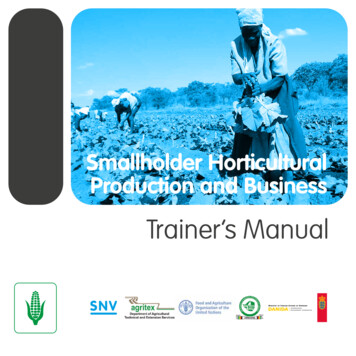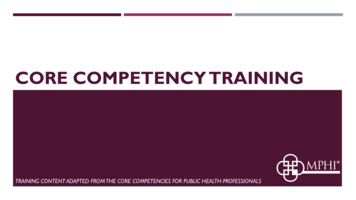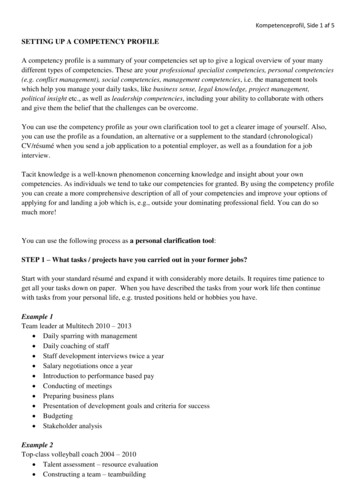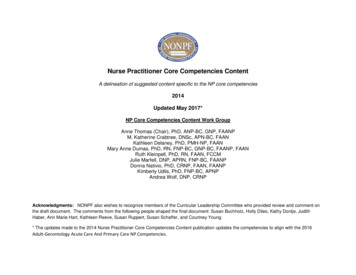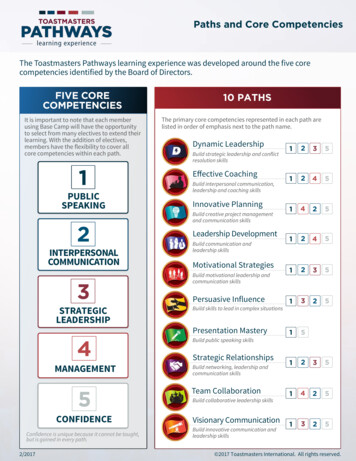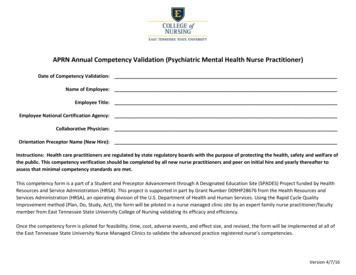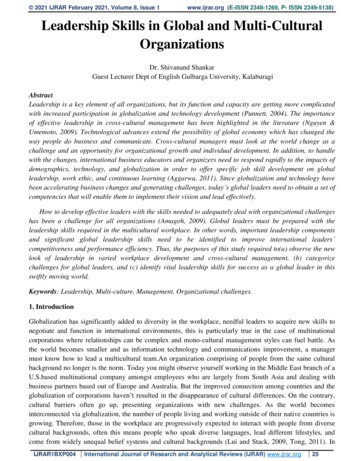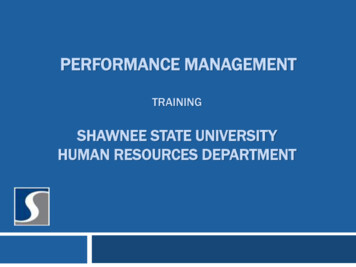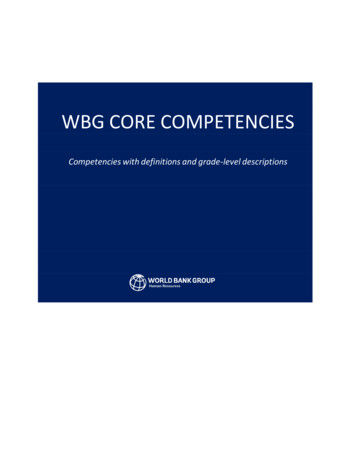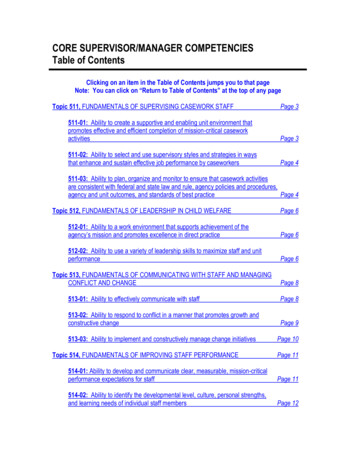
Transcription
CORE SUPERVISOR/MANAGER COMPETENCIESTable of ContentsClicking on an item in the Table of Contents jumps you to that pageNote: You can click on “Return to Table of Contents” at the top of any pageTopic 511, FUNDAMENTALS OF SUPERVISING CASEWORK STAFFPage 3511-01: Ability to create a supportive and enabling unit environment thatpromotes effective and efficient completion of mission-critical caseworkactivitiesPage 3511-02: Ability to select and use supervisory styles and strategies in waysthat enhance and sustain effective job performance by caseworkersPage 4511-03: Ability to plan, organize and monitor to ensure that casework activitiesare consistent with federal and state law and rule, agency policies and procedures,agency and unit outcomes, and standards of best practicePage 4Topic 512, FUNDAMENTALS OF LEADERSHIP IN CHILD WELFAREPage 6512-01: Ability to a work environment that supports achievement of theagency’s mission and promotes excellence in direct practicePage 6512-02: Ability to use a variety of leadership skills to maximize staff and unitperformancePage 6Topic 513, FUNDAMENTALS OF COMMUNICATING WITH STAFF AND MANAGINGCONFLICT AND CHANGEPage 8513-01: Ability to effectively communicate with staffPage 8513-02: Ability to respond to conflict in a manner that promotes growth andconstructive changePage 9513-03: Ability to implement and constructively manage change initiativesPage 10Topic 514, FUNDAMENTALS OF IMPROVING STAFF PERFORMANCEPage 11514-01: Ability to develop and communicate clear, measurable, mission-criticalperformance expectations for staffPage 11514-02: Ability to identify the developmental level, culture, personal strengths,and learning needs of individual staff membersPage 12
514-03: Ability to complete performance evaluations and to develop performanceimprovement plans with individual staffPage 12Topic 515, FUNDAMENTALS OF STAFF DEVELOPMENTPage 13515-01: Ability to facilitate individual learningPage 13515-02: Ability to create and sustain a constructive learning environment in theorganizationPage 13515-03: Ability to design individualized learning plansPage 14Topic 516, FUNDAMENTALS OF COLLABORATION AND TEAMWORKPage 15516-01: Ability to create a collaborative team environment that enhancesProductivityPage 15516-02: Ability to identify and build on unit strengths to promote teamworkPage 15Supervisor/Manager Core CompetenciesInstitute for Human Services for the Ohio Child Welfare Training Program – December 20092 of 16
Return to Table of ContentsCORE SUPERVISOR/MANAGER COMPETENCIESTOPIC: 511FUNDAMENTALS OF SUPERVISING CASEWORK STAFFSkill Sets511-01: Ability to create a supportive and enabling unit environment that promotes effectiveand efficient completion of mission-critical casework activities511-02: Ability to select and use supervisory styles and strategies in ways that enhanceand sustain effective job performance by caseworkers511-03: Ability to plan, organize, and monitor to ensure that casework activities areconsistent with federal and state law and rule, agency policies and procedures, agency andunit outcomes, and standards of best practiceSkill Set 511-01: Ability to create a supportive and enabling unit environment that promoteseffective and efficient completion of mission-critical casework activitiesComp. No.Competency Description511-01-001Knows the principles of family-centered, culturally competent, strengths-basedcasework practice, their importance in ensuring effective child welfare services,and the types of casework activities and interventions that reflect these principles511-01-002Knows the agency- and unit-level factors that can undermine caseworkers’comfort and performance, unit productivity, and staff safety511-01-003Understands the critical role of the supervisor in creating and sustaining a unitwork environment that promotes the highest quality caseworker services tochildren and families511-01-004Understands the rationale for consistency in adhering to agency mission, bestpractice standards, rules, policies, and procedures to promote effective caseworkpractice511-01-005Understands the supervisor’s responsibility to model cultural competence andethical conduct with staff, colleagues, clients, and community partners511-01-006Understands the value and power of regular and open communication in the unitto ensure adherence to policies and procedures, law, regulation, and bestpractice standards511-01-007Knows how to model and support fundamental child welfare values andprinciples with caseworkers, and how to help them perform activities and chooseservices that are consistent with these principles511-01-008Knows supervisory strategies to create and sustain a work environment thatencourages continuous self-assessment, quality improvement, and ongoing staffdevelopmentSupervisor/Manager Core CompetenciesInstitute for Human Services for the Ohio Child Welfare Training Program – December 20093 of 16
Return to Table of Contents511-01-009511-01-010511-01-011Can help caseworkers use strategies to manage and reduce job related stressCan help caseworkers locate and select service providers, intervention tools, andother resources to serve children and families in the context of their own culturesCan implement strategies that monitor and promote the safety of caseworkers inthe office and in the fieldSkill Set 511-02: Ability to select and use supervisory styles and strategies in ways thatenhance and sustain effective job performance by caseworkersComp. No.Competency Description511-02-001Knows the primary styles of supervision, the criteria that define each style, andtheir strengths and limitations511-02-002Understands how various supervisory styles differ in their approach to balancingrelationship development and task accomplishment511-02-003Understands one’s own preferred style of supervision and the characteristics,strengths, and limitations of that style511-02-004Understands the importance of being comfortable and proficient in multiplesupervisory styles, and of choosing the style best suited for the situation orcontext or to match an employee’s developmental level511-02-005Knows how to plan a supervisory approach that provides the most appropriatelevel of support and direction to help staff achieve a desired outcome511-02-006Can comfortably “style flex” to meet the specific requirements of uniquesupervisory situationsSkill Set 511-03: Ability to plan, organize, and monitor to ensure that casework activities areconsistent with federal and state law and rule, agency policies and procedures, agency andunit outcomes, and standards of best practiceComp. No.Competency Description511-03-001Knows the core values of “best practice” and “evidence-based practice” and theimportance of using this data to underpin all agency and casework practices511-03-002Knows the importance of maintaining up-to-date knowledge of current researchfindings, best practice standards, and laws, rules, and regulations511-03-003Knows the importance of regular monitoring and feedback in assuring effectivestaff performance511-03-004Knows data sources and data collection strategies that can support ongoingmonitoring of caseworker completion of job responsibilities511-03-005Understands the supervisor’s ongoing responsibility to plan, implement, andmonitor completion of unit objectives511-03-006Understands the importance of thorough and accurate case records inmonitoring and evaluating the quality of casework activities511-03-007Knows strategies to help staff plan, organize, and prioritize their work andmanage their time most effectivelySupervisor/Manager Core CompetenciesInstitute for Human Services for the Ohio Child Welfare Training Program – December 20094 of 16
Return to Table of Contents511-03-008511-03-009Knows how to use case assessment and case planning conferences to modeland promote the integration of fundamental best practice principles intocaseworkCan help caseworkers plan, organize, and reassess their work to maximizeeffectiveness and efficiency, and to promote desired outcomes in the unit and onindividual casesSupervisor/Manager Core CompetenciesInstitute for Human Services for the Ohio Child Welfare Training Program – December 20095 of 16
Return to Table of ContentsCORE SUPERVISOR/MANAGER COMPETENCIESTOPIC: 512FUNDAMENTALS OF LEADERSHIP IN CHILD WELFARESkill Set512-01: Ability to create a work environment that supports achievement of the agency’s missionand promotes excellence in direct practice512-02: Ability to use a variety of leadership skills to maximize staff and unit performanceSkill Set 512-01: Ability to create a work environment that supports achievement of theagency’s mission and promotes excellence in direct practiceComp. No.Competency Description512-01-001Knows the importance of a shared vision, mission, and values in motivating staffto excel in their work512-01-002Understands the relationships among agency purpose or mission, unit goals andobjective, policies, procedures, work activities, and outcomes512-01-003Understands the supervisor’s role as a leader in creating and sustaining a visionoriented, mission-focused, and outcome driven unit512-01-004Understands the relationship between continual learning, formal staffdevelopment, and staff’s confidence and ability to do their jobs512-01-005Understands the necessity of a supportive and caring work environment to keepstaff engaged and involved, and to promote high levels of investment in theirwork512-01-006Knows how to involve unit staff in creating and articulating a shared vision,values, and purpose that underpins and gives meaning to their daily work512-01-007Can clearly articulate a collective vision, mission, and fundamental values to staffand can help them understand how to integrate these into their daily workSkill Set 512-02: Ability to use a variety of leadership skills to maximize staff and unitperformanceComp. No.Competency Description512-02-001Knows the definitions and characteristics of transactional, transformational,participatory, and strengths-based leadership512-02-002Knows the core leadership behaviors necessary for transactional,transformational, participatory, and strengths-based leadership512-02-003Knows the nature, characteristics, strengths, and limitations of a variety ofsupervisory and leadership stylesSupervisor/Manager Core CompetenciesInstitute for Human Services for the Ohio Child Welfare Training Program – December 20096 of 16
Return to Table of 2-02-008512-02-009512-02-010Knows the various types of power, authority, and influence available tosupervisors, and their potential effect in leading the unit and individual staffUnderstands the importance of supervisors developing and enhancing theirpersonal leadership skillsUnderstands the nature, characteristics, strengths, and limitations of thesupervisor’s own preferred leadership style(s)Understands how effective leadership can enhance staff performance andsuccessful achievement of agency and unit objectivesKnows how to assess a situation and select a leadership style best suited to thetask, environment, and developmental level of staffKnows how to “style flex” in response to changing environmental andinterpersonal dynamicsCan use a variety of leadership skills to motivate staff to achieve high levels ofperformance excellenceSupervisor/Manager Core CompetenciesInstitute for Human Services for the Ohio Child Welfare Training Program – December 20097 of 16
Return to Table of ContentsCORE SUPERVISOR/MANAGER COMPETENCIESTOPIC: 513FUNDAMENTALS OF COMMUNICATING WITH STAFF AND MANAGINGCONFLICT AND CHANGESkill Set513-01: Ability to effectively communicate with staff513-02: Ability to respond to conflict in a manner that promotes growth and constructive change513-03: Ability to implement and constructively manage change initiativesSkill Set 513-01: Ability to effectively communicate with staffComp. No.Competency Description513-01-001Knows the factors that comprise effective verbal and written communication andthe factors that undermine their effectiveness513-01-002Understands how contradictions between verbal and nonverbal communicationscan affect the delivery of the intended message513-01-003Understands one’s innate or preferred communication style and how it affectscommunication with people whose styles differ from one’s own513-01-004Understands the importance of continuous dialogue and feedback in promotingachievement of desired outcomes513-01-005Understands the ways in which open and effective communication and regularfeedback are essential to the successful functioning of the unit513-01-006Understands the ways that strengths-based communication strategies motivatestaff and enrich the supervisor-staff relationships513-01-007Knows how and when to use feedback and strengths-based communicationstrategies to resolve individual and unit performance problems513-01-008Knows how to communicate openly and realistically with staff about nonperformance issues in a strengths based manner513-01-009Knows how to use strategies such as active listening and dialogue to promoteconstructive communication, promote mutual understanding, and to prevent orresolve conflict513-01-010Knows how to elicit and use feedback from the unit to improve supervisorypractice and unit outcomes513-01-011Can adjust one’s own communication style based on the situation and thecommunication styles or needs of others513-01-012Can help staff recognize their own and others’ preferred communication styles513-01-013Can help staff recognize when their communication styles or strategies may befueling interpersonal communication problems or conflict with colleagues andwith familiesSupervisor/Manager Core CompetenciesInstitute for Human Services for the Ohio Child Welfare Training Program – December 20098 of 16
Return to Table of Contents513-01-014Can help staff use strengths-based communication strategies in their work withfamilies and childrenSkill Set 513-02: Ability to respond to conflict in a manner that promotes growth andconstructive changeComp. No.Competency Description513-02-001Knows the typical stages in the development and evolution of conflict, and atwhich stages intervention is most likely to successfully resolve the conflict513-02-002Understands how conflict can be transformed into a constructive tool to promoteproductive change513-02-003Understands the personal, interpersonal, and organizational dynamics thatsupport and sustain conflict513-02-004Understands how individual and cultural differences in work styles, expectations,and communication styles can create conflict513-02-005Understands the ways that unaddressed and unresolved conflict can undermineindividual and unit productivity513-02-006Knows strategies to help staff address interpersonal and situational conflicts thatimpede achievement of outcomes513-02-007Knows how to encourage and support staff to acknowledge and constructivelyaddress unresolved conflicts513-02-008Can help staff use open communication and engagement strategies to resolveconflicts with peers or client families resulting from individual and/or culturaldifferencesSupervisor/Manager Core CompetenciesInstitute for Human Services for the Ohio Child Welfare Training Program – December 20099 of 16
Return to Table of Contents513-02-009513-02-010Can regularly use conflict management strategies to elicit and deal with potentialresistance and to promote effective collaboration in achieving unit objectivesCan comfortably take the initiative to acknowledge and resolve personal conflictwith staff, peers, and administratorsSkill Set 513-03: Ability to implement and constructively manage change initiativesComp. No.Competency Description513-03-001Knows the stages in a change process and the opportunities, barriers, andpotential risks typical of each stage513-03-002Knows what actions can be used during each phase of change to maintainmomentum and focus on achieving goals and objectives513-03-003Understands the supervisor’s role and responsibility in initiating, leading, andmonitoring change initiatives in the unit513-03-004Understands the various causes, dynamics, and inevitability of change in thechild welfare system513-03-005Understands the supervisor’s responsibility to constructively lead and guide staffthrough changes brought about by government, community, or larger agencyevents or actions513-03-006Understands the ways that intended changes often produce unintendedconsequences513-03-007Understands the inherent threats, opportunities, and challenges brought about byany change and the variety of ways staff respond to these513-03-008Knows strategies supervisors can use to help staff adjust to change and continueto function effectively513-03-009Can manage and monitor change in a manner that limits resistance andencourages continued productivity513-03-010Can identify unintended consequences of change and design strategies to dealwith these as a part of the larger change management planSupervisor/Manager Core CompetenciesInstitute for Human Services for the Ohio Child Welfare Training Program – December 200910 of 16
Return to Table of ContentsCORE SUPERVISOR/MANAGER COMPETENCIESTOPIC: 514FUNDAMENTALS OF IMPROVING STAFF PERFORMANCESkill Sets514-01: Ability to develop and communicate clear, measurable, mission-criticalperformance expectations for staff514-02: Ability to identify the developmental level, culture, personal strengths, and learningneeds of individual staff members.514-03: Ability to complete performance evaluations and to develop performanceimprovement plans with individual staffSkill Set 514-01: Ability to develop and communicate clear, measurable, mission-criticalperformance expectations for staffComp. No.Competency Description514-01-001Knows the importance of formalizing performance expectations into clear,consistent and standardized job descriptions514-01-002Knows the importance of establishing challenging but attainable performanceexpectations for all staff514-01-003Understands how activities, performance expectations, and measures arederived from organizational mission and desired outcomes514-01-004Understands how clearly defined performance expectations can motivate highlevels of staff performance and successful achievement of outcomes514-01-005Understands how organizational factors including poorly defined mission, unclearjob roles and activities, lack of supervision, and shifting priorities undermine staffperformance514-01-006Knows how to involve staff in identifying and establishing performanceexpectations and measures for their jobs514-01-007Knows how to create job activities, expectations, and performance measures thatreflect mission-critical agency and unit outcomes and best practice standards514-01-008Can use supervisory conference to initiate and encourage dialogue with staffmembers about performance expectations and measures514-01-009Can determine if staff understand performance expectations and measures, andcan help staff become invested in achieving these expectationsSupervisor/Manager Core CompetenciesInstitute for Human Services for the Ohio Child Welfare Training Program – December 200911 of 16
Return to Table of ContentsSkill Set 514-02: Ability to identify the developmental level, culture, personal strengths, andlearning needs of individual staff membersComp. No.Competency Description514-02-001Knows the importance of ongoing staff development for effective jobperformance514-02-002Understands how personal, interpersonal, organizational, cultural andenvironmental factors interact to increase or impede staff motivation to achievehigh levels of performance excellence514-02-003Understands how skill sets and competencies are organized and used to assessindividual learning needs and to shape individual development plans514-02-004Understands the difference between deficiencies in knowledge and skill anddeficiencies of execution, and how these interact to affect job performance514-02-005Knows how to use supervisory conferences, unit meetings, case reviews, andobservations of caseworkers as ongoing strategies to identify staff’sdevelopmental needs514-02-006Can involve staff in assessing their strengths and developmental needs and indeveloping plans for personal and professional growth514-02-007Can work with staff to differentiate their learning needs from non-trainingperformance problems that require other supervisory interventionsSkill Set 514-03: Ability to complete performance evaluations and to develop performanceimprovement plans with individual staffComp. No.Competency Description514-03-001Knows the components of effective performance evaluation protocols andperformance improvement plans514-03-002Knows the potential sources and types of performance information and outcomemeasures needed to identify and understand performance gaps514-03-003Understands the importance of engaging staff to collaborate in performanceevaluation, and of completing evaluations within an ongoing, supportive, anddevelopmental supervisor/supervisee relationship514-03-004Understands the importance of using predetermined, clearly defined, behavioral,and measurable, descriptions of desired job performance as the criteria forperformance evaluation514-03-005Understands the personal and interpersonal factors that may increase bothemployees’ and supervisors’ resistance to completing performance evaluations514-03-006Knows how to design performance improvement plans to enhance successfulplan implementation514-03-007Can engage and fully involve staff in evaluating and planning to improve their jobperformance514-03-008Can plan, design, and implement supervisory interventions that address bothdeficits of knowledge and skill and deficits of execution514-03-009Can observe, monitor, and evaluate employee performance to determine if aperformance improvement plan is effectively changing practiceSupervisor/Manager Core CompetenciesInstitute for Human Services for the Ohio Child Welfare Training Program – December 200912 of 16
Return to Table of ContentsCORE SUPERVISOR/MANAGER COMPETENCIESTOPIC: 515FUNDAMENTALS OF STAFF DEVELOPMENTSkill Sets515-01: Ability to facilitate individual learning515-02: Ability to create and sustain a constructive learning environment in the organization515-03: Ability to design individual learning plansSkill Set 515-01: Ability to facilitate individual learningComp. No.Competency Description515-01-001Knows the factors that affect an employee’s interest in, readiness, and motivationto learn515-01-002Understands the characteristics of various learning styles, how they affect thelearning process, and supervisory/education strategies that best support eachstyle515-01-003Understands the primary characteristics of adult learners at different stages ofdevelopment and how these affect the success of various learning strategies515-01-004Understands how lack of preparation for a learning activity and feedback during itcan impede the learning process515-01-005Understands how routine job activities can be used as “learning moments” forstaff515-01-006Can help staff identify their preferred learning styles and the most effectivelearning strategies for those styles515-01-007Can implement strategies to enhance employees’ readiness to learn and toprepare them for specific learning activities515-01-008Can help staff identify and resolve barriers that may impede learningSkill Set 515-02: Ability to create and sustain a constructive learning environment in theorganizationComp. No.Competency Description515-02-001Knows the qualities of a positive learning environment and the necessaryconditions to achieve it515-02-002Knows the factors that promote the successful transfer of newly acquired skillsfrom training to the job, and those that prevent it from occurring515-02-003Knows the importance of ongoing supervisory and administrative support tocreate and sustain a constructive learning environment in the unit515-02-004Understands the responsibilities of the learner, supervisor, administrators,trainers, and peers in promoting transfer of learning and skill developmentSupervisor/Manager Core CompetenciesInstitute for Human Services for the Ohio Child Welfare Training Program – December 200913 of 16
Return to Table of Contents515-02-005515-02-006515-02-007Knows strategies to assess the work environment to identify barriers to learning,and strategies to eliminate these barriersCan proactively set up necessary structures and an atmosphere in the unit thatsupports continuous employee developmentCan advocate for changes at the administrative and policy level to increaseorganizational support for learning, transfer, and skill masterySkill Set 515-03: Ability to design individual learning plansComp. No.Competency Description515-03-001Understands the purpose and functions of educational supervision and itsimportance in promoting organizational effectiveness515-03-002Understands how the nature and quality of the supervisor/supervisee relationshipaffects educational supervision515-03-003Knows a variety of teaching, coaching, and feedback strategies that supervisorscan use to promote learning and support transfer515-03-004Knows how to choose supervisory strategies best suited to the learning goalsand the employee’s level of development515-03-005Knows how to recognize and respond to potential learning opportunities in dailyactivities and supervisory conferences (teachable moments)515-03-006Can design and implement individual development plans based on staffmembers’ learning needs, preferred learning styles and level of development515-03-007Can support and direct staff members’ use of new learning on the job to sustainmotivation to change work behavior, and to promote mastery of newly acquiredskills515-03-008Can model and provide coaching in specific skills in which staff need furtherdevelopmentSupervisor/Manager Core CompetenciesInstitute for Human Services for the Ohio Child Welfare Training Program – December 200914 of 16
Return to Table of ContentsCORE SUPERVISOR/MANAGER COMPETENCIESTOPIC: 516FUNDAMENTALS OF COLLABORATION AND TEAMWORKSkill Set516-01: Ability to create a collaborative team environment that enhances productivity516-02: Ability to identify and build on unit strengths to promote teamworkSkill Set 516-01: Ability to create a collaborative team environment that enhancesproductivityComp. No.Competency Description516-01-001Knows the importance of collaboration and interdependence among staff at alllevels, and among work units, program areas, agency departments, and withcommunity organizations516-01-002Knows the personal, interpersonal, and organizational factors that promotecollaboration and those that undermine it516-01-003Understands how poorly defined mission, job expectations, and other systemicfactors can undermine the collaboration necessary to achieve outcomes516-01-004Understands how the authority vested in certain job roles and responsibilities canaffect the development of collaborative relationships516-01-005Understands the supervisor’s role in modeling and promoting collaboration andinterdependence to achieve agency, unit, and individual outcomes516-01-006Understands how a supervisor’s ability to collaborate with staff can reinforce thevalue of collaborative worker-client relationships516-01-007Knows strategies to address and resolve “turf issues” within and between agencyunits and departments516-01-008Can identify when a lack of coordination and integration is a factor in theagency’s failure to achieve desired outcomes516-01-009Can use supervisory strategies that promote both intra- and inter-unitcollaborationSkill Set 516-02: Ability to identify and build on unit strengths to promote teamworkComp. No.Competency Description516-02-001Knows the characteristics of effective teams and work groups516-02-002Knows the stages of group development and the typical characteristics ofworkers at each stage516-02-003Understands the potential uses and benefits of unit meetings for planning,monitoring, problem-solving, education, transfer of learning, and maximizinggroup productivitySupervisor/Manager Core CompetenciesInstitute for Human Services for the Ohio Child Welfare Training Program – December 200915 of 16
Return to Table of 6-02-008516-02-009Understands the value of involving unit members in decisions about their ownand the unit’s workKnows how to determine when the unit can provide valuable input for asupervisory decision, and when a problem or issue is best addressed by the unitas a groupKnows how to plan, organize, and lead effective unit meetingsKnows strategies to help the unit develop into a cohesive and productive workgroupKnows how to select the most effective supervisory strategies for a group’scurrent level of developmentCan promote teamwork among the unit to enhance group performance andachieve outcomesSupervisor/Manager Core CompetenciesInstitute for Human Services for the Ohio Child Welfare Training Program – December 200916 of 16
Supervisor/Manager Core Competencies Institute for Human Services for the Ohio Child Welfare Training Program - December 2009 4 of 16 511-01-009 Can help caseworkers use strategies to manage and reduce job related stress 511-01-010 Can help caseworkers locate and select service providers, intervention tools, and other resources to serve children and families in the context of their own cultures
